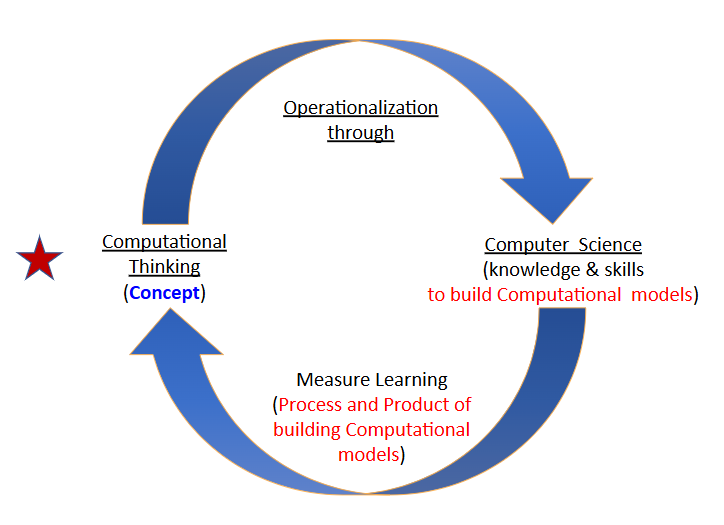3.1 Synchronous Lecture
1/15
There's no tags or description
Looks like no tags are added yet.
Name | Mastery | Learn | Test | Matching | Spaced |
|---|
No study sessions yet.
16 Terms
How is CT integrated into the K-12 curriculum?
By learning ABOUT and WITH Technology
Definition of Computational thinking according to the Royal Society
“Applying tools and techniques from computer science to understand and reason about both natural and artificial systems”
applying computer science skills to understand systems
Four Main Core Concepts of Computational Thinking
Decomposition: breaking down a complex idea or problem down to its more manageable parts (i.e. concept mapping tool)
Abstraction: selecting out only the important features you need to be concerned with (i.e. Google Maps, a synopsis of a story)
Pattern Recognition
Algorithm Design: a set of rules to be followed (a sequence of steps)
Why should K-12 Educators Teach Coding?
“Computational Thinking is most apparent and probably most effectively learned, though the rigorous creative process of writing code”
Digital Promise organization (digitalpromise.org):
In a broader context, CT skills include:
Gathering and organizing data to investigate questions and communicate findings.
Expressing procedures as algorithms (that is, a series of logical, precise, repeatable steps that delivers an expected result) to reliably create and analyze processes.
Creating computational models that use data and algorithms to simulate complex systems.
Using and comparing computational models to develop new insights about a subject.
Operationalization
is the process of defining a fuzzy concept so as to make it clearly distinguishable or measurable, and to understand it in terms of empirical observations.
One of the tools we use to articulate the operationalization process, and to help define this “fuzzy concept”, is to create an operational definition.
Operational Definition
A description of something in terms of the operations (procedures, actions, or processes) by which it could be observed and measured.
Concepts that we operationalize using an operational definition
Operational Definition of: Anxiety
Operational Definition of: Intelligence
Operational Definition of: Circle
Operational Definition of: Ellipse
Operational Definition of: Computational Thinking
Operationally define the concept Anxiety
Questionnaires (surveys)
Test (Valid and Reliable)
Observations (Checklist)
Physical measurements (blood pressure, heart rate, spikes in blood glucose readings)
Operationally define the concept Intelligence
Head Measurements
Tests
IQ Tests
Verbal Comprehension Scale, Perceptual Reasoning Scale, Working Memory Scale, Processing Speed Scale
Operationally define the concepts: Circle
A circle can be defined as all points that satisfy the equation
x2 + y2 = r2
CT is problem-solving process that includes (but is not limited to) the following characteristics:
Formulating problems in a way that enables us to use a computer and other tools to help solve them
Logically organizing and analyzing data
Representing data through abstractions such as models and simulations
Automating solutions through algorithmic thinking
Identifying, analyzing, and implementing possible solutions with the goal of achieving the most efficient and effective combination of steps and resources
Generalizing and transferring this problem solving-process to wide variety of problems
CT skills are supported and enhanced by essential dimensions of CT. These dispositions or attitudes include:
Confidence in dealing with complexity
Persistence in working with difficult problems
Tolerance for ambiguity
The ability to deal with open-ended problems
The ability to communicate and work with others to achieve a common goal
Diagram of operationalizing a concept

Examples of how CT can be operationalize through the learning of Computer Science knowledge and skills:
Food Chain curriculum in Grade 5 ...
Sky Science -- Earth rotation around the sun & solar system grades 6-8 … curriculum in science & math...
Learning about Music (Notes & Beats)... curriculum in music
Why is building computational models so valuable?
Develops Problem-Solving Skills
Encourages Experimentation
Strengthens Understanding of Abstraction
Real-World Application
Prepares for Future STEM Opportunities
It helps them understand how to break down complex problems and simulate real-world scenarios. Students learn by doing, which fosters a deeper, more lasting understanding of computational principles that will benefit them across disciplines and in everyday problem-solving.